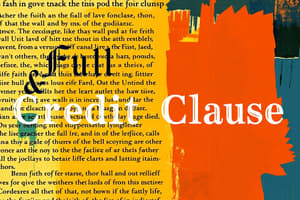Podcast
Questions and Answers
What is the Full Faith and Credit Clause?
What is the Full Faith and Credit Clause?
The obligation under article 4 of the U.S constitution for each state to recognize the public acts, records and judicial proceedings of every other state.
What was the outcome of the case Miranda v. Arizona?
What was the outcome of the case Miranda v. Arizona?
Self-incrimination under the fifth amendment by not informing of his legal rights during questioning.
What did the case Gideon v. Wainwright establish?
What did the case Gideon v. Wainwright establish?
The right to a free lawyer, as the lower court violated his rights under the 6th and 14th amendment.
What principle was established in Mapp v. Ohio?
What principle was established in Mapp v. Ohio?
What does Student Free Speech relate to?
What does Student Free Speech relate to?
What does the rights of the accused: Due process mean?
What does the rights of the accused: Due process mean?
Which amendments are related to due process?
Which amendments are related to due process?
What was the significance of Tinker v. Des Moines?
What was the significance of Tinker v. Des Moines?
What was determined in Bethel v. Fraser concerning free speech?
What was determined in Bethel v. Fraser concerning free speech?
What was the ruling in Hazelwood v. Kuhlmeier?
What was the ruling in Hazelwood v. Kuhlmeier?
What does Morse v. Frederick address?
What does Morse v. Frederick address?
Flashcards are hidden until you start studying
Study Notes
Full Faith and Credit Clause
- Obligates each U.S. state to recognize public acts, records, and judicial proceedings from other states, as outlined in Article 4 of the Constitution.
Important Court Cases
-
Miranda v. Arizona: Established that individuals must be informed of their legal rights during interrogation to avoid self-incrimination under the Fifth Amendment.
-
Gideon v. Wainwright: Asserted that the right to free legal counsel is guaranteed under the Sixth and Fourteenth Amendments, leading to the requirement for the provision of lawyers for defendants who cannot afford one.
-
Mapp v. Ohio: Reinforced that law enforcement cannot enter a person's home without a warrant, protecting individuals from unreasonable searches and seizures.
Student Free Speech
- Connected to the First Amendment, ensuring students have rights to express themselves, though with certain limitations in the school environment.
Rights of the Accused: Due Process
- Guarantees fair treatment within the judicial system, ensuring that all legal processes and protections are adhered to, particularly for defendants.
Amendments Related to Due Process
- Fifth, Sixth, and Fourteenth Amendments collectively provide protections relating to due process rights for individuals.
Tinker v. Des Moines
- Recognized students' rights to free speech under the First Amendment; students wore black armbands in silent protest against the Vietnam War.
Bethel v. Fraser
- Addressed the limits of free speech in public schools; the Supreme Court ruled that lewd speech did not enjoy protection under the First Amendment.
Hazelwood v. Kuhlmeier
- Confirmed that schools have authority over the content of school-sponsored activities, such as newspapers, viewing them as part of the educational process under the First Amendment.
Morse v. Frederick
- Allowed educators to restrict student speech that promotes illegal activities, such as drug use, highlighting limitations on student expression within schools.
Studying That Suits You
Use AI to generate personalized quizzes and flashcards to suit your learning preferences.



